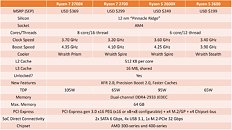Sunday, March 25th 2018

AMD Ryzen 7 "2800X" Not Part of First Wave
AMD is preparing to launch its first wave of 12 nm Ryzen 2000-series "Pinnacle Ridge" processors in April, with possible availability on the 19th. From all of the materials leaked to the web, it's becoming clear that the Ryzen 7 2700X will be the company's next flagship socket AM4 processor, with a "2800X" not being part of the first wave of "Pinnacle Ridge" chips. Adding further to the theory of the first wave of "Pinnacle Ridge" chips being led by the 2700X, is the leaked cover of the next issue of print magazine CanardPC, which screams "2700X," and includes a roundup of second-generation Ryzen parts from 2200G all the way through the 2700X. The 2700X, besides process and minor architectural refinements, also features higher clocks than the current company flagship in the segment, the Ryzen 7 1800X. It's clocked at 3.70 GHz base, with 4.35 GHz boost, and XFR 2.0 driving the clocks up even further, compared to the 3.60/4.00/4.20 GHz (base/boost/max-XFR) of the 1800X. For this reason alone, the 2700X will be a faster part.
AMD has the advantage of having sized up Intel's Core i7-8700K before deciding to lead with the 2700X. The possible 2800X will depend on Intel's short-term response to the 2700X. There were rumors late last year of a possible speed-bumped "Core i7-8720K." AMD's first wave of Ryzen 2000-series "Pinnacle Ridge" will be as brisk as Intel's first "Coffee Lake" desktop processors, with just four SKUs - the Ryzen 7 2700X, the Ryzen 7 2700, the Ryzen 5 2600X, and the Ryzen 5 2600. Besides higher clocks, the chips could feature a minor IPC uplift (vs. first-generation "Summit Ridge") thanks to rumored faster (lower-latency) caches, support for higher memory clocks, updated Precision Boost algorithms, and XFR 2.0.
AMD has the advantage of having sized up Intel's Core i7-8700K before deciding to lead with the 2700X. The possible 2800X will depend on Intel's short-term response to the 2700X. There were rumors late last year of a possible speed-bumped "Core i7-8720K." AMD's first wave of Ryzen 2000-series "Pinnacle Ridge" will be as brisk as Intel's first "Coffee Lake" desktop processors, with just four SKUs - the Ryzen 7 2700X, the Ryzen 7 2700, the Ryzen 5 2600X, and the Ryzen 5 2600. Besides higher clocks, the chips could feature a minor IPC uplift (vs. first-generation "Summit Ridge") thanks to rumored faster (lower-latency) caches, support for higher memory clocks, updated Precision Boost algorithms, and XFR 2.0.


71 Comments on AMD Ryzen 7 "2800X" Not Part of First Wave
I said that because at 4Ghz on all core my 1700x is only doing 1733 on cinebench, and the leak suggest that a stock 2700x can do 1780, wich is why i think that the all core boost is more aggresive because that's not a score that a 3.7Ghz Ryzen could do. But it's all based on a leak, so i could be wrong.
With all that being said , what sort of miracle TDP did you expect AMD could pull off which not even their competitor can properly achieve ?
I assume they will try to justify on higher base clocks.
I still think its a descent improvement from a node shrink with some miner memory latency improvements.
Should bring them closer for Gaming compared to Intel.
At the end of the day, the same amount of $$$ buys you a slightly faster CPU than last years, so it's not all bad. In fact, it's only bad if you were hoping to see significant more performance from this year's batch.
So the 12nm 2000 series will all go for Ryzen Desktop & Ryzen TR...
Also what do you mean costs considerably more? I paid 320$ for my 8700K.
forums.guru3d.com/threads/amd-ryzen-7-2700x-print-review-spotted-to-be-released-over-the-weekend.420079/
But I'm surprised at the powerconsumption figures, that node shrink had literaly 0 impact on efficiency, 142 w is already what an oc R7 can pull at 3.9-4Ghz.
Furthermore CPU World shows them for $359 OEM and $370 white box.
www.cpu-world.com/CPUs/Core_i7/Intel-Core i7 i7-8700K.html
In fact you don't even have an i7-8700k. If you did then you would have known what the correct price was.
Besides 6 cores moves far less data than 8 cores and software that IS optimized for 8+ cores does run considerably faster.
The only true thing you did say was "2 extra cores are pointless for" YOU.
And he didn't say he bought from Amazon either.
Interesting results for sure. Without spoiling the journalists’ work, performance is higher but so is power consumption...and it’s bit more than 105W!
Clocks are really good though, and turbo behavior is much better with 3+ cores active. Definitely puts more pressure on Intel.
Won’t make me retire my 1700@4GHz however, I’ll happily wait for the 3000 series :)
105 W / 65 W = 1.615
4.35 GHz / 4.1 GHz = 1.06
95 W / 65 W = 1.4615
4.25 GHz / 3.9 GHz = 1.09
So for X models we have 6% more performance for 61.5% more juice with R7 ... or 9% more performance for 46.15% more juice with R5